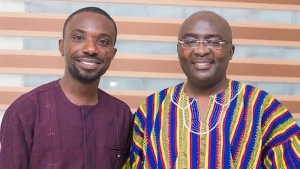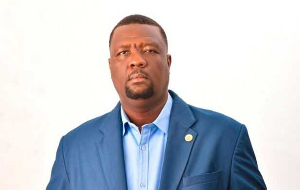The title of this piece is taken from the photo clip [attached here] which demonstrates the extent to which the Ghana Police and NLC Government went in order to have the first President of Ghana arrested, while his comprehensive 7-year development plan was left to rot. The 7 year development plan (1963-1970) was the first and best in Africa, which was cut short and led Korea and Malaysia to overtake Ghana, leaving us to remain one of the rich beggar nations of the world for 50 years. I am going to make personal and national reflection around this piece of history.
This piece of old newspaper has been in my possession since 1980 while I was a student at Yendi Secondary School (YESS). In 1980, while studying towards my G.C.E ‘O’-Level, I was avoiding my Chemistry lesson and found comfort in strolling aimlessly to the groundnut seller. (Old students of YESS know that we used to patronise the roasted groundnuts). This piece of paper was used to wrap roasted groundnuts. After eating-up my groundnuts, I observed that the photos were no ordinary ones; especially the fact that it showed what was earmarked for the first president of Ghana on his overthrow in 1966. I found it interesting and thought it was a treasure. Over the years I made sure it was not lost, although I did not really know what to do with such interesting and yet sad piece of history. However on the occasion of the 99th Birthday of the first president of Ghana (which is also an election year) I have chosen to write something about what it meant to me and to share it with fellow Ghanaians. This small piece of history set me thinking about what the future holds for any person having political power. It was just after the frightening days of the 1979 revolution and the start of the Liman Administration. In that short period of the Liman administration, the feeling was similar to a change of season- it was as though the spring season had set itself over a northern European community after a brutal long winter. In the whole of Ghana, there was the feeling of relief from the intimidating presence of military men in all public places, who molested people with impunity.
The Liman administration was like the start of another cycle of life. There was a cheer in every face and a spring in every step (Mark Twain) and I quite vividly remember that these pictures of the first President of Ghana set me thinking about politicians. And my young mind could not help thinking that perhaps someone would one day issue such a warrant for Rawlings, Boakye Gjan and others of the AFRC regime. However, my mind went back to feeling sorry for the first President of Ghana, who had by combination of charm, intellect and luck or destiny led Ghana to the independence. How could anyone do that to such a man, who was instrumental in setting us free and whose action was responsible for my ability to even read that old newspaper as a poor young Ghanaian from ‘Northern Territories’?.
Over the years I came to realise and appreciate Nkrumah’s gamble which saw his Positive Action re-energise the unstoppable independence train and resulted in the setting up of the free basic education for all in 1952. For me the appreciation of Nkrumah’s gamble with his Positive Action always rests on asking, if Nkrumah had not acted the way he did, is it possible that Ghana would be an independent state by 1980 or even today? And what would such a scenario mean for me as an educated northern Ghana today? Without such a gamble, I wonder whether I would actually have gone to school at all? Seriously, come to think of it……. Self –Rule in the Gold Coast was an experiment by the British Government and the success led to independence for the rest of Africa. So if positive action did not happen, what would have happened to us? And more so me- from Northern Territories, where until 1952, lived under the colonial government’s age-old segregation policy, which advocated only limited education (Only up to what used to be called standard 7) for northern Ghanaians. Is it possible my parents would have sent me to school if the free compulsory basic education policy did not take foothold?. Well so much for my personal reflection of potential gloom.
At the time of Nkrumah’s overthrow, the 7 year development plan (1963-1970) was in its third year and in line with that vision of tying the growth of education and skills development to industry and agriculture, millions of dollars had been poured into each of these important sectors. The University of Ghana (Legon) and the University of Science Technology were expected to turn out over 800 top level management personal and engineers within the period of the 7–year plan. This was to allow the new industries to progressively grow to at least 65-70 % capacity by 1970. The University of Cape Coast (established by the Government) was to train teachers for the many Ghana Education Trust Fund Secondary schools that mushroomed across the country in just two years (1959-1960). All of these Ghana Education Trust Fund schools and new technical training institutions were expected to turn out middle level management and technical skill personnel to feed these expanding industries /enterprises and the diversifying economy. Well, the irony is that instead of the NLC looking for ways to ensure the country’s resources poured into these industries would not go to waste, they more interested in hunting down just one man and to kill his vision. It is know that a lot of Kwame Nkrumah’s writings, files and documents were shipped away by the CIA, and with it was lost any chance of us knowing what Nkrumah thought and envisioned about these investments and the future. In order words, while they were busy issuing warrants and hunting for him, they forgot that we had sunk millions of Cedis into factories and industries that needed to grow make us the best example of an emerging African economy. They left those industries to rot.
Today, the fact of life in Ghana is that in spite of all our rhetoric, many Ghanaians are suffering in the midst of plenty, because successive governments have spoken more than they have delivered and it is hard to see anyone government that has boldly dealt with corruption in the manner Nkrumah did. What we need today is boldness of action towards re-energising our resolve to ensure that every Ghanaian will have the basic necessities of life through self-less service (which on its own will generate glory from the people and God). After 51 years of independence, and exactly 42 years after Nkrumah was declared wanted, the poverty and desperation of the people are even more overwhelming. The dream of all Ghanaians is to have a leader that would govern for the sake of the citizens and not their pockets. There have been so many promises and vows to take us to the Promised Land since Nkrumah was declared wanted and there have been so many disappointments.
Today Nkrumah is not wanted by Interpol but by Ghanaians yearning to see a leader like him come forth to fulfil the dreams of a nation that has so much potential and which never wins even a bronze when the moment requires us to deliver. In this election year, we are looking for just that kind of leader and it coincides with two interesting developments which mirror Nkrumah’s time, namely; the birth of a new CPP, and an unprecedented increase in the numbers of children enrolling and staying in school. Fortunately we now also possess an enviable egg ready to deliver oil (black gold). If Nkrumah was alive what would all that mean for his 7-year development plan which comprehensively tied educational development to the great vision of Ghana becoming the first industrialised African country.
Is there any politician who can deliver this vision? I am certainly excited to see a more powerful, 3-pronged field of play in this current election. I hope Paa Kwesi Nduom and his CPP are able to provide the stimulus that our politics needs for better accountability in Government than we have seen in the last decades. Nkrumah is still wanted as a Messiah, but as the Nigerian comedy “Parliament on Sale’ said, If there was a telephone to Heaven, we would telephone God to send him back.
Ahmed Bawa Kuyini CEVS-Ghana, Tamale.
Opinions of Thursday, 2 October 2008
Columnist: Kuyini, Ahmed Bawa
Wanted On Warrant: Kwame Nkrumah
Entertainment













